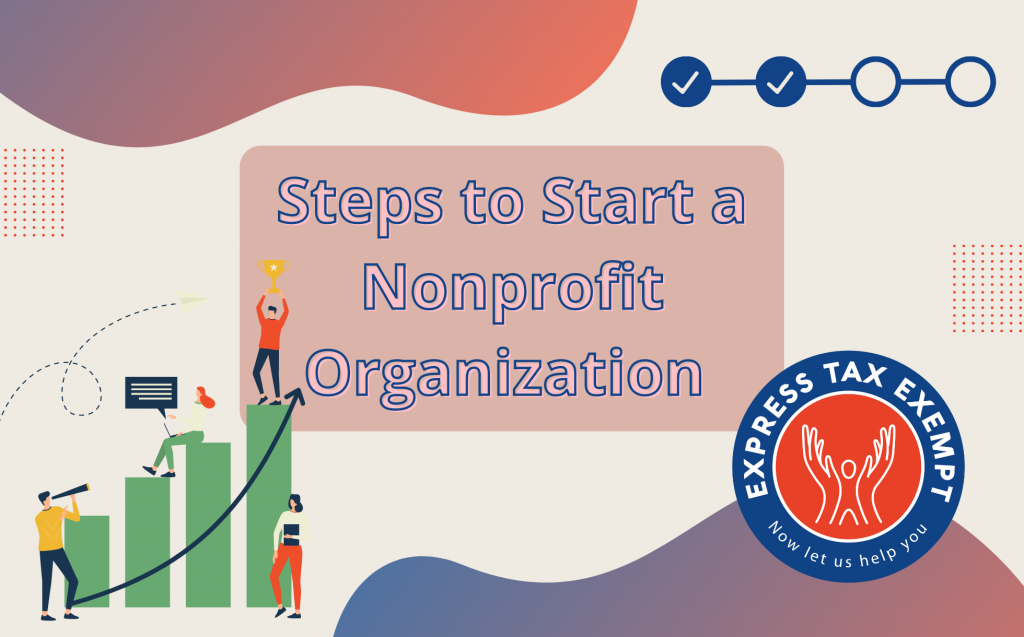Steps to Start a Nonprofit Organization

Starting, growing, and sustaining a nonprofit organization requires a lot of effort and a thorough understanding of nonprofit requirements.
Here at ExpressTaxExempt, we are committed to helping nonprofit organizations remain tax-compliant. We know running a nonprofit organization is an overwhelming task. That’s why we created this complete guide for starting a successful nonprofit organization.
Step 1: Research
The most important part of starting a nonprofit is to determine if there is a need for it. If there are other organizations already doing what you’re planning, how would your nonprofit add extra value to the community? Once you’ve established a need, there are several other aspects to consider such as:
- Is it a cause others would want to support?
- Do you have any potential board members?
- How are you planning to fund your nonprofit?
- Can you cover the startup costs?
Step 2: Establish your organization’s Foundation
Step two involves building the structure of your organization. The first part of this step may seem like a no-brainer, but you will need to choose a name for your organization. Next, you should outline your organization’s purpose and mission statement. Your mission statement is a brief description that explains what you do and why you do it. You should also establish a business plan for your organization. Your business plan can be used as a guide for how your nonprofit will run and how you’ll achieve your goals.
You will also need to build a team of members to help you run your nonprofit. This will include your board members, staff, and volunteers. Depending on their role, these individuals may help you regulate compliance, make decisions, support everyday operations, and much more.
Step 3: File Articles of Incorporation
To form a nonprofit organization, you need to file articles of incorporation. A nonprofit article of incorporation is a legal document filed with the secretary of state to create your nonprofit corporation. This process is called incorporating. Requirements for nonprofit articles of incorporation can vary by state. Information commonly required by the state and the IRS includes the nonprofit’s name/address, name of incorporators, name/address of board members, statement of purpose, and duration of your nonprofit.
Incorporating allows your organization to register your organization name, limit the personal liability of the directors and members, add credibility to your organization, and pave the way for applying for tax-exempt status.
Step 4: Apply for an Employer Identification Number
Your nonprofit will need to get an employer identification number (EIN). To do so, you will need to hire staff, open a bank account in your organization’s name, and fill out the necessary forms. You can apply for your EIN with the IRS.
Step 5: Create your Bylaws
Bylaws are the rules that govern your nonprofit organization. When creating your bylaws, it’s important to obtain applicable state laws and ensure your nonprofit’s bylaws are in compliance with them. A nonprofit’s bylaws can help protect it from potential problems by clearly outlining rules around authority levels, rights, and expectations. An organization’s bylaws will include information such as:
- Name and purpose
- Election, roles, and terms of board members and officers
- Membership responsibilities
- Meeting guidelines
- Board structure
- Compensation and indemnification of board members
- Role of chief executive officer
- Conflict of interest policy
- Amendment of bylaws
- Dissolution of the organization
Step 6: File for 501(c)(3) Tax-Exempt Status
Nonprofit organizations will need to apply for tax-exempt status with the IRS. To apply for recognition by the IRS of exempt status under section 501(c)(3), use a Form 1023-Series application. 501(c)(3) is the most commonly-sought tax-exempt status as it includes charitable, educational, and religious organizations. When applying for tax-exempt status, organizations will need to provide supporting documents such as articles, bylaws, and financial reports.
Nonprofit organizations must make their approved application for recognition of exemption as well as their last three annual information returns available for public inspection.
Step 7: Remaining Tax-Compliant
Most tax-exempt organizations are required to file Form 990 information returns with the IRS annually. These forms collect information regarding an organization’s revenue, expenses, board members, achievements, and other operational information. Most organizations must file Form 990, 990-EZ, or 990-N. Private foundations must file Form 990-PF. In addition to annual tax filing requirements, organizations may be required by their state to file annual reports regarding updates and any changes in management or contact information.
Outside of tax filing requirements, there are a number of requirements nonprofit organizations must follow to remain in good standing with the IRS. Before you form a nonprofit organization, you should become familiar with all of these compliance guidelines.
ExpressTaxExempt
ExpressTaxExempt is an IRS-authorized e-file provider that nonprofits can use to file their annual information returns quickly and easily. ExpressTaxExempt supports e-filing for Forms 990, 990-EZ, 990-N, 990-PF, 990-T, 8868, 1120-POL, and CA 199.

